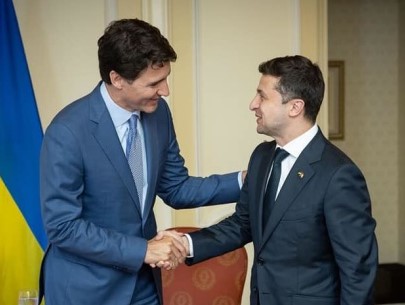March 9, 2022
-CBC
Prime Minister Justin Trudeau was given a stark reminder of wars present and past on Wednesday in Berlin.
Prior to his first bilateral meeting with Germany’s new chancellor, Trudeau spoke with Ukraine’s President Volodymyr Zelensky, telling him Canada will ship more specialized military equipment.
The federal cabinet has approved an additional $50 million in military and humanitarian aid, Trudeau said during a media availability at the German Chancellery building on Wednesday. Trudeau also invited Zelensky to address Parliament virtually — something the embattled president has agreed to do.
The latest batch of military equipment includes cameras for surveillance drones to help Ukrainian forces keep eyes on Russian troops, tanks and artillery.
“We have obtained a number of specialized equipment, including cameras used in drones, that a Canadian company makes, that we will be able to start sending in the coming days towards Ukraine,” Trudeau said.
All allied nations that have been shipping arms to Ukraine have had to fly the equipment to neighbouring countries and then drive the aid over the border. Russia has been growing increasingly angry and U.S. intelligence has warned it may strike at the supply lines.
NATO Secretary General Jens Stoltenberg said in an interview with CBC News that an attack on allied supplies on alliance territory would be a grave escalation.
“As you well know, there are challenges at the borders in terms of getting equipment securely across and into Ukrainian hands, but we are working through that with partners, alongside all allies who are facing the logistical challenges that are real but not insurmountable,” Trudeau said.
Ukraine has struggled with reconnaissance and relied partly on civilian drone enthusiasts to help repel the military invasion.
Poland recently proposed to hand over its entire stock of Soviet-era MiG29 jets to Ukraine by flying them to the U.S. air base in Ramstein, Germany. The Pentagon has rejected the offer and German Chancellor Olaf Scholz poured further cold water on the idea, telling reporters on Wednesday that his country doesn’t support the plan.
“Today is about peace. That is what the people [of Ukraine] who are under shelling deserve,” Scholz said during his welcoming address, while noting he and Trudeau also spoke about climate change and energy security.
Germany is one of the most pacifist nations in Europe, ever since losing the Second World War to the Allies, and it recently reversed decades of foreign policy by providing weapons to Ukraine.
Germany has been in an uncomfortable position throughout the crisis — because of its dependency on natural gas from Moscow.
Earlier, Trudeau was given a reminder of the horrors of the Second World War when he visited a Holocaust memorial at Platform 17 in western Berlin.
The train station is where tens of thousands of Jews were deported from the city to death camps during the Nazi regime.




